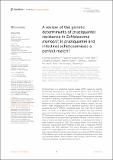Files in this item
A review of the genetic determinants of praziquantel resistance in Schistosoma mansoni : is praziquantel and intestinal schistosomiasis a perfect match?
Item metadata
| dc.contributor.author | Summers, Shannan | |
| dc.contributor.author | Bhattacharyya, Tapan | |
| dc.contributor.author | Allan, Fiona | |
| dc.contributor.author | Stothard, J Russell | |
| dc.contributor.author | Edielu, Andrew | |
| dc.contributor.author | Webster, Bonnie L. | |
| dc.contributor.author | Miles, Michael A. | |
| dc.contributor.author | Bustinduy, Amaya L. | |
| dc.date.accessioned | 2022-09-06T09:30:19Z | |
| dc.date.available | 2022-09-06T09:30:19Z | |
| dc.date.issued | 2022-08-22 | |
| dc.identifier | 281195802 | |
| dc.identifier | 839a7fdf-4f4e-4ba7-82a6-4b2808bd01fe | |
| dc.identifier | 85152925230 | |
| dc.identifier.citation | Summers , S , Bhattacharyya , T , Allan , F , Stothard , J R , Edielu , A , Webster , B L , Miles , M A & Bustinduy , A L 2022 , ' A review of the genetic determinants of praziquantel resistance in Schistosoma mansoni : is praziquantel and intestinal schistosomiasis a perfect match? ' , Frontiers in Tropical Diseases , vol. 3 , 933097 . https://doi.org/10.3389/fitd.2022.933097 | en |
| dc.identifier.issn | 2673-7515 | |
| dc.identifier.other | Jisc: 584809 | |
| dc.identifier.uri | https://hdl.handle.net/10023/25954 | |
| dc.description | SS receives studentship funding from the UK Medical Research Council London Interdisciplinary Doctoral program (MR/N013638/1). | en |
| dc.description.abstract | Schistosomiasis is a neglected tropical disease (NTD) caused by parasitic trematodes belonging to the Schistosoma genus. The mainstay of schistosomiasis control is the delivery of a single dose of praziquantel (PZQ) through mass drug administration (MDA) programs. These programs have been successful in reducing the prevalence and intensity of infections. Due to the success of MDA programs, the disease has recently been targeted for elimination as a public health problem in some endemic settings. The new World Health Organization (WHO) treatment guidelines aim to provide equitable access to PZQ for individuals above two years old in targeted areas. The scale up of MDA programs may heighten the drug selection pressures on Schistosoma parasites, which could lead to the emergence of PZQ resistant schistosomes. The reliance on a single drug to treat a disease of this magnitude is worrying should drug resistance develop. Therefore, there is a need to detect and track resistant schistosomes to counteract the threat of drug resistance to the WHO 2030 NTD roadmap targets. Until recently, drug resistance studies have been hindered by the lack of molecular markers associated with PZQ resistance. This review discusses recent significant advances in understanding the molecular basis of PZQ action in S. mansoni and proposes additional genetic determinants associated with PZQ resistance. PZQ resistance will also be analyzed in the context of alternative factors that may decrease efficacy within endemic field settings, and the most recent treatment guidelines recommended by the WHO. | |
| dc.format.extent | 12 | |
| dc.format.extent | 5568909 | |
| dc.language.iso | eng | |
| dc.relation.ispartof | Frontiers in Tropical Diseases | en |
| dc.subject | Preventive chemotherapy | en |
| dc.subject | Praziquantel | en |
| dc.subject | Drug resistance | en |
| dc.subject | Drug tolerance | en |
| dc.subject | Blood flukes | en |
| dc.subject | Schistosomes | en |
| dc.subject | Schistosoma mansoni | en |
| dc.subject | QR Microbiology | en |
| dc.subject | SDG 3 - Good Health and Well-being | en |
| dc.subject.lcc | QR | en |
| dc.title | A review of the genetic determinants of praziquantel resistance in Schistosoma mansoni : is praziquantel and intestinal schistosomiasis a perfect match? | en |
| dc.type | Journal item | en |
| dc.contributor.institution | University of St Andrews. Scottish Oceans Institute | en |
| dc.contributor.institution | University of St Andrews. School of Biology | en |
| dc.identifier.doi | https://doi.org/10.3389/fitd.2022.933097 | |
| dc.description.status | Peer reviewed | en |
This item appears in the following Collection(s)
Items in the St Andrews Research Repository are protected by copyright, with all rights reserved, unless otherwise indicated.

